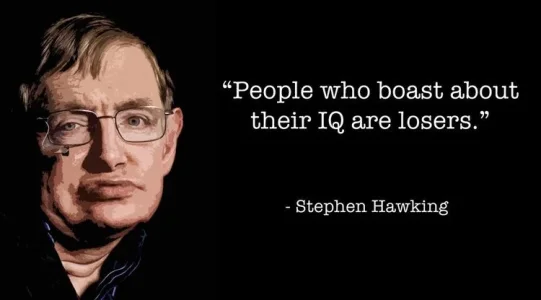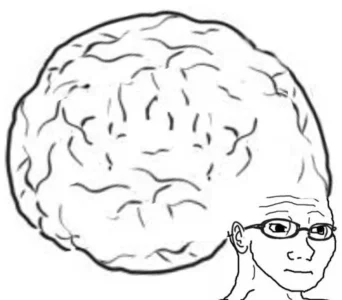La Sagna
I did it! I'm a butterfly!
- MBTI
- INFJ
- Enneagram
- 9
I have known several people who have tested with a very high IQ and who are completely socially inept. None of them make a decent comfortable living. Most people I know have a much lower IQ then them but live a much more productive and functional life.
I know I have a fairly high IQ but I think it is other types of intelligence that I possess that help me to function better than the people I mentioned above.
I think Gardner's theory of intelligence is a much more accurate portrayal of intelligence in all it's forms:
I would score very low on some of these and very high on others, like everyone else.
My son has learning dissabilities so reading and writing has always been a challenge but math and physics are easy for him. He could never explain how he got the answers to the math problems, he could just see the answer but using language to explain was impossible. Everybody has strengths and weaknesses. A friend of mine is an absolute genius at fixing anything and at inventing things but don't ask him about money and keeping track of it because that goes right over his head.
I know I have a fairly high IQ but I think it is other types of intelligence that I possess that help me to function better than the people I mentioned above.
I think Gardner's theory of intelligence is a much more accurate portrayal of intelligence in all it's forms:
Dr. Howard Gardner, a psychologist and professor of neuroscience from Harvard University, developed the theory of Multiple Intelligences (MI) in 1983. The theory challenged traditional beliefs in the fields of education and cognitive science. Unlike the established understanding of intelligence -- people are born with a uniform cognitive capacity that can be easily measured by short-answer tests -- MI reconsiders our educational practice of the last century and provides an alternative.
According to Howard Gardner, human beings have nine different kinds of intelligence that reflect different ways of interacting with the world. Each person has a unique combination, or profile. Although we each have all nine intelligences, no two individuals have them in the same exact configuration -- similar to our fingerprints. To read about the benefits of MI and for tips on implementing MI in your classroom, visit the Tips section. For additional MI resources, visit the Resources section.
For Gardner, intelligence is:
• the ability to create an effective product or offer a service that is valued in a culture;
• a set of skills that make it possible for a person to solve problems in life;
• the potential for finding or creating solutions for problems, which involves gathering new knowledge.
HOWARD GARDNER'S NINE MULTIPLE INTELLIGENCES:
1. Linguistic Intelligence: the capacity to use language to express what's on your mind and to understand other people. Any kind of writer, orator, speaker, lawyer, or other person for whom language is an important stock in trade has great linguistic intelligence.
2. Logical/Mathematical Intelligence: the capacity to understand the underlying principles of some kind of causal system, the way a scientist or a logician does; or to manipulate numbers, quantities, and operations, the way a mathematician does.
3. Musical Rhythmic Intelligence: the capacity to think in music; to be able to hear patterns, recognize them, and perhaps manipulate them. People who have strong musical intelligence don't just remember music easily, they can't get it out of their minds, it's so omnipresent.
4. Bodily/Kinesthetic Intelligence: the capacity to use your whole body or parts of your body (your hands, your fingers, your arms) to solve a problem, make something, or put on some kind of production. The most evident examples are people in athletics or the performing arts, particularly dancing or acting.
5. Spatial Intelligence: the ability to represent the spatial world internally in your mind -- the way a sailor or airplane pilot navigates the large spatial world, or the way a chess player or sculptor represents a more circumscribed spatial world. Spatial intelligence can be used in the arts or in the sciences.
6. Naturalist Intelligence: the ability to discriminate among living things (plants, animals) and sensitivity to other features of the natural world (clouds, rock configurations). This ability was clearly of value in our evolutionary past as hunters, gatherers, and farmers; it continues to be central in such roles as botanist or chef.
7. Intrapersonal Intelligence: having an understanding of yourself; knowing who you are, what you can do, what you want to do, how you react to things, which things to avoid, and which things to gravitate toward. We are drawn to people who have a good understanding of themselves. They tend to know what they can and can't do, and to know where to go if they need help.
8. Interpersonal Intelligence: the ability to understand other people. It's an ability we all need, but is especially important for teachers, clinicians, salespersons, or politicians -- anybody who deals with other people.
9. Existential Intelligence: the ability and proclivity to pose (and ponder) questions about life, death, and ultimate realities.
I would score very low on some of these and very high on others, like everyone else.
My son has learning dissabilities so reading and writing has always been a challenge but math and physics are easy for him. He could never explain how he got the answers to the math problems, he could just see the answer but using language to explain was impossible. Everybody has strengths and weaknesses. A friend of mine is an absolute genius at fixing anything and at inventing things but don't ask him about money and keeping track of it because that goes right over his head.







